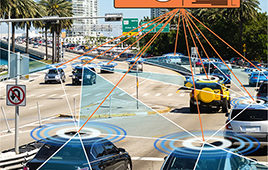Geoinformatics: Transporting Geology to the Future
 |
| “Societal Challenges and Geoinformatics,” a new volume from The Geological Society of America, discusses the many facets of geoinformatics. Senior volume editor A. Krishna Sinha of Virginia Tech writes. Courtesy of Geological Society of America |
Geoinformatics: What does it mean? It means disaster management; sustainability assessment; societal impacts and benefits of properly managing geologic metadata; global satellite data dissemination; development of international geoscience standards; bridging the barriers of terminology and data; international cooperation for global mapping; and “e-geoscience.” A new volume from The Geological Society of America covers all that and more.
Senior volume editor A. Krishna Sinha of Virginia Tech writes that “The fusion of informatics technologies with geoscience-based data and tools signals a necessary change in the way we manage the future of our science.”
Geoscientists around the world recognize the urgency in developing new information management capabilities to meet the ever growing needs to discover, manage, and sustain resources, as well as provide capabilities for forecasting adverse events for the public at large. This volume contains papers from researchers addressing some of these capabilities as they are being developed across the globe, and it highlights the future goal of geoinformatics to make data and tools available for meeting societal challenges.
Simply put, geoinformatics is about transforming data to knowledge, and promoting “data without borders.”
Individual copies of the volume may be purchased through the Geological Society of America online bookstore, http://www.geosociety.org/bookstore/default.asp?oID=0&catID=9&pID=SPE482, or by contacting GSA Sales and Service, [email protected].
“Societal Challenges and Geoinformatics,” A. Krishna Sinha, David Arctur, Ian Jackson, and Linda Gundersen (editors), Geological Society of America Special Paper 482 SPE482, 191 p, ISBN 978-0-8137-2482-9




